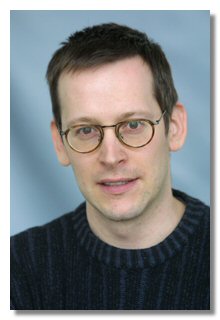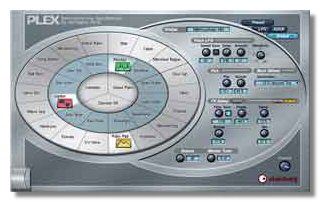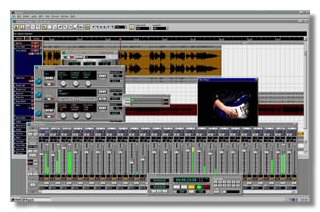Yvan Grabit, a French man in Hambourg

This interview was first realized for Keyboards / Home Studio magazine. It is published here with their kind authorization, thanks ,o)
Maybe his name is unknown to you, but you probably know the guy's work. If I talk to you about Nuendo, HALion, The Grand, Plex... Yvan is one of the programers working at Steinberg's and it seemed interesting to me to discover who's hiding behind this software which make the current events of Keyboards and DAW world regularly !
The general public doesn't know you of necessity... Could you sum up your CV ?
 Already 33 years old (34 this year :o(, married and a little 18-month old boy.
After a quiet childhood in Gex land (an area jammed between Jura mountains and
Switzerland with Geneva), with an eye over Mont Blanc (fanciful especially
the sun setting and rising)... Between High School and Academy, brass bands and
dance bands (musette, pop, ...), I found myself in Annecy in preparatory
school, and then finished in an Engineering School in Paris at ISEP (Institut
Supérieur d´Électronique de Paris = Electronic Superior Institute of Paris), with Graphics as a specialization.
Is coming after a first experience of 8 months long in Germany at Rostock, being a Professor Assistant
in Graphics Processing, then I am one more time in Paris in a graphics firm
(Fleximage) as a Project engineer, still in graphics processing, not
for a long time because that society was bought by Aerospatiale and so far I've been
in Cannes for 3 years... Dreamlife... Office 20 meters from the beach...
Already 33 years old (34 this year :o(, married and a little 18-month old boy.
After a quiet childhood in Gex land (an area jammed between Jura mountains and
Switzerland with Geneva), with an eye over Mont Blanc (fanciful especially
the sun setting and rising)... Between High School and Academy, brass bands and
dance bands (musette, pop, ...), I found myself in Annecy in preparatory
school, and then finished in an Engineering School in Paris at ISEP (Institut
Supérieur d´Électronique de Paris = Electronic Superior Institute of Paris), with Graphics as a specialization.
Is coming after a first experience of 8 months long in Germany at Rostock, being a Professor Assistant
in Graphics Processing, then I am one more time in Paris in a graphics firm
(Fleximage) as a Project engineer, still in graphics processing, not
for a long time because that society was bought by Aerospatiale and so far I've been
in Cannes for 3 years... Dreamlife... Office 20 meters from the beach...
How a French man working in graphics can find himself to work in Germany on Audio at Steinberg's ?
What I haven't told yet is that my girlfriend at this time was German... (and now my wife...). Thus, at the beginning, it's for a heart business that I met at Hamburg. Here, I met Steinberg. They were looking for developers under UNIX for a new product... Nuendo... It was in 1997.
What's your part at Steinberg's ? Do you manage a project from start to end or do you have one or many specialities that you apply on every projects ? And what are the programs which bear your signature ?
Because of my scientific training, I handled the VST plug-in part (integration, evolution), the Audio processing one (DSP, Filter, EQ, convolution, automatic tempo detection and note pitch) and the Surround. At the beginning, we were 3 developers only on Nuendo, so we shared out between ourselves the tasks according to our preferences and our affinities. At the same time, I developed a library dealing with the graphic interface for VST plug-ins, crossable to MAC (OS9 et X), SGI (Silicon Graphic), SUN, BeOS and of course Windows. It allowed me to have some contact with the VST world including more than 300 developers all over the world, from TCWorks, Native, Waves, Universal Audio to students who were writing for their school projects or as a hobby. Then, I began to write some plug-ins too : NuendoEQ, SurroundPanner, Chopper, Tranceformer, Metalizer... Next, later, some greater projects with Karl (a.k.a Charly) Steinberg : LM4-MkII, The Grand, HALion, Plex, HALion String Player. Thus, as you can see, no time to get bored during those 5 last years... That's what I enjoyed immediately at Steinberg's, this possibility to work in different scopes, creative, very enrichable and very motivating.
Data processing applied to Audio evolves fastly. How do you see your future and the market on which it evolves ?
Steinberg's bet was always to say : « We shall only make native products» , that is to say using only the computer's CPU to create a virtual studio, including arrangement, effects, mixing... It was betting on the evolution of the CPU's power... Today with a 3-GHz PC, for example, you can achieve real-time processings (or effects) which, only 2 years ago, were never released because of their greediness for CPU... There is no reason for it to stop. If you take a look at what's happening, it seems that we are going to an integration of video world in audio world (or the opposite ?), with a better integration and interactivity (Emagic-Apple, Steinberg-Pinnacle). Those products will make possible to achieve easy DVD editing of your last holydays with a good quality up to professional movie productions via the realisation of video clips for music bands at less cost, all in Surround. We will see... I am not a prophet ;-)
Steinberg often ventured as a pioneer on some platforms that other people weren't considering especially to be credible or conformed (SGI, BeOS, etc.). What's the result today ? Are Windows and Mac OS some fatalities ?
 Unfortunately, it seems to be impossible to struggle against the monster Microsoft,
even if on the technological side BeOS system was much more advanced, but
the law of the stronger... It must be said also that Mac OSX (although it is not
mature enough) has finally become a clean system, much modern. The great advantage of
Windows is the fact that it makes interfacing between different parts
(software or hardware) a standard, thus the programmer doesn't waste his time rewriting
the whole stuff, starting inventing things over and over again. For Steinberg, this SGI and BeOS adventure had
some positive aspects, especially about a much considered, much framed, source code programming, a
crossable one.
Unfortunately, it seems to be impossible to struggle against the monster Microsoft,
even if on the technological side BeOS system was much more advanced, but
the law of the stronger... It must be said also that Mac OSX (although it is not
mature enough) has finally become a clean system, much modern. The great advantage of
Windows is the fact that it makes interfacing between different parts
(software or hardware) a standard, thus the programmer doesn't waste his time rewriting
the whole stuff, starting inventing things over and over again. For Steinberg, this SGI and BeOS adventure had
some positive aspects, especially about a much considered, much framed, source code programming, a
crossable one.
Steinberg do, indeed, master the art of innovation and, even more, have a certain talent for selling and imposing those concepts so that they become standards (VST, VSTi, ASIO...). How do you explain that ?
As I explained before, at Steinberg's a wide flexibility, therefore a liberty of creativity, is given to every developer. Charly musn't be forgiven, he is very often responsible for new concepts. Moreover, because we work on several platforms encouraged us to establish some standards which allow us to better focus ourselves on the insertion of new functionnalities. The success of those concepts is that they are independant from the type of computer and that their definitions stayed purposely easy : writing a VST instrument plug-in can be done in about a few hours in a very few code lines, while a Dxi requires a certain expertise...
At this time, is all possible in Audio with a computer or are there still some impassable limits left ?
No, all is not possible... At least, not yet... We will never have enough CPU power... While waiting for the ultimate processor at 100 GHz or more, we have the possibility to use several computers linked together and thus to share ressources... Don't throw away your old PC !! ;o) VST Link (VSL) allows this... One year ago, a studio sound engineer in Germany who was working on a Surround project called me to announce with enthusiasm that he mixed 140 audio tracks (stereo and mono merged) using 80 Surround Panners, with a dual PC 1 GHz and Nuendo ; that is not too bad knowing that there is no hardware solution (console) which would have allowed this... Ok, we are still far from the 2000 tracks used for Titanic.
How does a program arises at Steinberg's ? What is the path followed by one of your pieces of software ?
I would say that it is the merging of a bunch of ideas coming from various horizons ; even from developers (95 % of them being musicians), from marketing which follows the market tendencies (including the distributors like Steinberg France), from the users with whom we share a lot during « chats », on the mailing-lists (beta-lists, Cubase.net, as well as Espace Cubase with their wishing lists...). In internal we have some meetings which allow to define the majorlines, to organize those various ideas which are then approved or corrected by the bosses... Then, they are distributed and worked in smaller groups. All along the course, there's a to and fro movement with the testers (Quality department) in order to optimize the integration of the new concepts. Then follow the alpha and beta test stages of the product by using some external testers... And the distribution...
A few weeks ago, it was announced that Pinnacle was buying Steinberg. What's your feeling about this ?
My first reaction, like most of my colleagues, was a light dispointment, the feeling that we were going to lost our identity, our Steinberg family spirit, I think it is a normal reaction when you are bought. But after, I've realized all the opportunities that it would offer to us concerning the development, as well as a certain financial stability, that is not negligible in the times we live. After meetings with some representatives from Pinnacle, we saw and understood that this « wedding » will be very complementary allying Audio and Video, that Steinberg will stay Steinberg and will always be the « dealer » with Audio.
I suppose that you are kept in secret but can you tell us a word about your actual works ?
I'm working actually on the final touches of the version 2.0 of Nuendo which Surround part as well as the VST engine have been completely revisited, restructured in order to allow the management of the Surround like some mono or stereo. I'm working also on a HALion update.
When a Steinberg software is released on the market, it is generally « cracked » in the following 48 hours : how do you live this ? Do you think that the protections must be reinforced at all prices or that, for example, the notion of service is the only one which can give to someone the desire of buying a software he can find anyway easily and freely on the Web ?
 Here, we are touching a sensible point, an eternal discussion. It is sure that software creators
lost enormously money because of hacking. The sales of
Cubase SX, for example, falled down from 20 to 30% the day there was the
« cracked » version. Hacking will always exist, but it should be make
understand to cracked versions users, I'm talking about those who
really use those softwares, that quality improvement and the evolution of the
products don't come from the air of the season, that there are behind this a lot of people
who work on them and who live from this. It's this take of conscience which should be promoted,
especially in France where hacking is very present. While waiting for
the possibility to « outlive », we don't have another choice than protecting the
softwares when counting on the lapse of time between the starting of the sales and the
first cracked version. That doesn't prevent from developing and widing
the notion of service opened to the real users, like do
certain mailing- lists by limiting their access to the people who have registred
their softwares (Note : that is the case of the the ML Cubase-fr from Espace Cubase).
Here, we are touching a sensible point, an eternal discussion. It is sure that software creators
lost enormously money because of hacking. The sales of
Cubase SX, for example, falled down from 20 to 30% the day there was the
« cracked » version. Hacking will always exist, but it should be make
understand to cracked versions users, I'm talking about those who
really use those softwares, that quality improvement and the evolution of the
products don't come from the air of the season, that there are behind this a lot of people
who work on them and who live from this. It's this take of conscience which should be promoted,
especially in France where hacking is very present. While waiting for
the possibility to « outlive », we don't have another choice than protecting the
softwares when counting on the lapse of time between the starting of the sales and the
first cracked version. That doesn't prevent from developing and widing
the notion of service opened to the real users, like do
certain mailing- lists by limiting their access to the people who have registred
their softwares (Note : that is the case of the the ML Cubase-fr from Espace Cubase).
Today, more in France than anywhere else, the difference between Cubase SX and Nuendo is not very clear for everybody. Nuendo 2.0, with among other things the Midi editors of SX won't necessary clear the things for the common run of mankind. What are the real differences, according to you ?
Cubase and Nuendo share a whole of functionnalities like ASIO, VST, Midi and Audio engine, editors, but in order to answer to all the whishes from the different worlds of musical production, we decided to give an aim to each product. Nuendo is a product designed for post-production, broadcast and sound design (maybe much the world of sound engineer) including the specifications linked to this domain (film, Surround, format, synchronization...), whereas Cubase is much more musician oriented for composition and production with a big part linked to musical creativity.
Cubase SX is now released since a few months. Can this product be considered as to be set or is it called to evolve a lot ?
It will evolve, of course, the next versions will include some new fonctionnalities dedicated to musicians as well as some improvements of the ones which are already present. A soonest version wouldn't delay...
What's your look over competition. Do you closely watch over what is done elsewhere or would you rather like to ignore this competition in order to not distort the vision you have about your work ? I ask my question in an other way : do you often steal some ideas « from the opposite » ?!
Naturally, we read the press, participate to the Messe while having a look to what made competition, we even buy their products ! It's all the art of creation and development the fact to inspire themselves from what exists, to take what is nice, to improve it if possible and to merge it with our own ideas and concepts. Besides, certain user requests are of type : « a friend uses the software X by Y and he can do this with that, it would be nbice if I could do also the same thing, but like that... ». The reverse is also true, a lot of ideas and improvements from Steinberg can be found at the competition via the facto standard (VST, ASIO,...).
The question I should have asked you in first : are you a musician ? It seems that I have readen that you are or have been a drummer...
And yes, a drummer... Although I have started with classical guitar while my grandmother wanted me to play absolutely accordion. I've done several years at the Music Academy of Geneva in percussions, especially with the vibraphone. But actually I play drums in a German band from Hambourg : « Piroschka Superstar »... And our singer sings in French ! We try to have a share in the French-German reconciliation byn promoting French language in northern Germany... It must be said that it is rather easy, German women fall in love when they hear the French accent ;o)
We will end by a much personal question : aren't you too much homesick ?
Hambourg is a very international town (there are about 6,000 French people), very opened on the world in the cultural domain, very green with its mini lake in the town center, there are even more bridges (2,400) than in Venise. We are at 150 km from Danemark, 80 km from Eastern Sea and 80 km from Northern Sea. Adding the fact that I work at Steinberg, that's why I don't have really time to be homesick. Ok, it arrives sometimes, when the the sky is grey and when it is -15 degrees Celsius, that I think about Cote d´Azur...
Thanks Yvan for the time you granted to us...
A littl' tour at Yvan's ?





